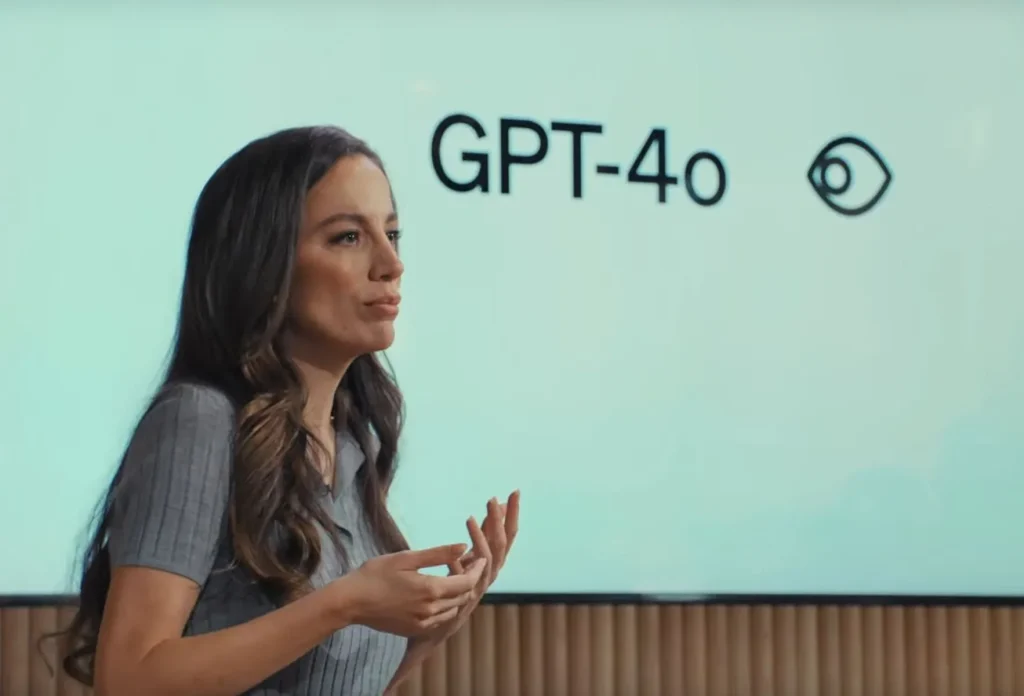For the most part, since its inception in late 2022, ChatGPT from OpenAI has responded to claims that it is more than just an AI model, denying any feelings or desires. It seems like OpenAI is attempting to make the chatbot behave more human-like with the upgrades they unveiled on Monday.
The updated ChatGPT may mimic human emotions, respond quickly to genuine speech signals, and carry on natural-sounding conversations, according to demonstrations.
Over the course of Monday’s webcast from OpenAI’s San Francisco headquarters, chief technologist Mira Murati revealed that ChatGPT will run on a whole new, more robust AI model named GPT-4o. All ChatGPT users, paid and free, will have access to the model through the new desktop app, the mobile app, and the web version.
Related: ChatGPT Coming to Apple’s iPhone with iOS 18?
Compared to OpenAI’s earlier technologies, ChatGPT can reply faster to speech, picture, and video input thanks to the GPT-4o model, according to Murati. While demonstrating ChatGPT’s capabilities, she and other OpenAI staff had animated discussions with it. ChatGPT responded with a lively and expressive female voice and gracefully handled interruptions.
ChatGPT responded to the chat in a variety of emotional tones, as if it were feeling all the feels. The chatbot flirtatiously gushed, “Oh, stop it, you’re making me blush,” in response to an OpenAI employee’s claim that he had been praising the chatbot’s “useful and amazing” features.
“We will be making these capabilities available to everyone over the next few weeks. It feels absolutely magical, and that’s fantastic,” Murati commented.
During another part of the demonstration, ChatGPT asked OpenAI researcher Barret Zoph, “How can I brighten your day today?” in response to his greeting. Zoph asked ChatGPT to analyze a selfie he’d taken and identify his feelings. ChatGPT enthusiastically replied, “I’ll put my emotional detective hat on” and concluded, “It looks like you’re feeling pretty happy and cheerful… No matter what’s happening, you seem to be in a fantastic mood.”
On Monday, OpenAI CEO Sam Altman wrote a blog post praising the new interface and its importance. “It feels like AI from the movies, and it’s still a bit surprising to me that it’s real,” Altman wrote. “It turns out that there is a significant shift in the way we respond and express ourselves when we reach human levels.”
According to OpenAI, ChatGPT’s improved image processing capabilities (including the ability to retain more user data in its “memory” for a more tailored experience) and GPT-4o model make it more capable of understanding visual content like photos and charts.
OpenAI has announced that it will upgrade all users to its most competent AI model, GPT-4o, by making it available to users of the free version of ChatGPT.
Exploring the Implications of OpenAI’s GPT-4o Upgrade
While OpenAI’s changes might increase ChatGPT’s popularity and engagement, they could also alter users’ perceptions of the program.
ChatGPT’s incredible capacity to write text and answer questions with what often resembles humanlike intelligence made it a hit last year. However, up until now, OpenAI and major rivals like Google have largely tried to rein in the anthropomorphism of their chatbots by making them refuse to answer specific questions and by reminding users that they are, after all, just computer programs.
Regardless of the caveats, the most recent chatbots are able to evoke feelings in their consumers with their conversational prose. Some businesses have figured out how to make the most of this trend by creating artificial intelligence (AI) companions that can mimic human emotions or even serve as virtual romantic partners. Some experts in artificial intelligence have expressed concern about the potential undesirable consequences of using systems that can imitate and react to human emotions in the long run.


